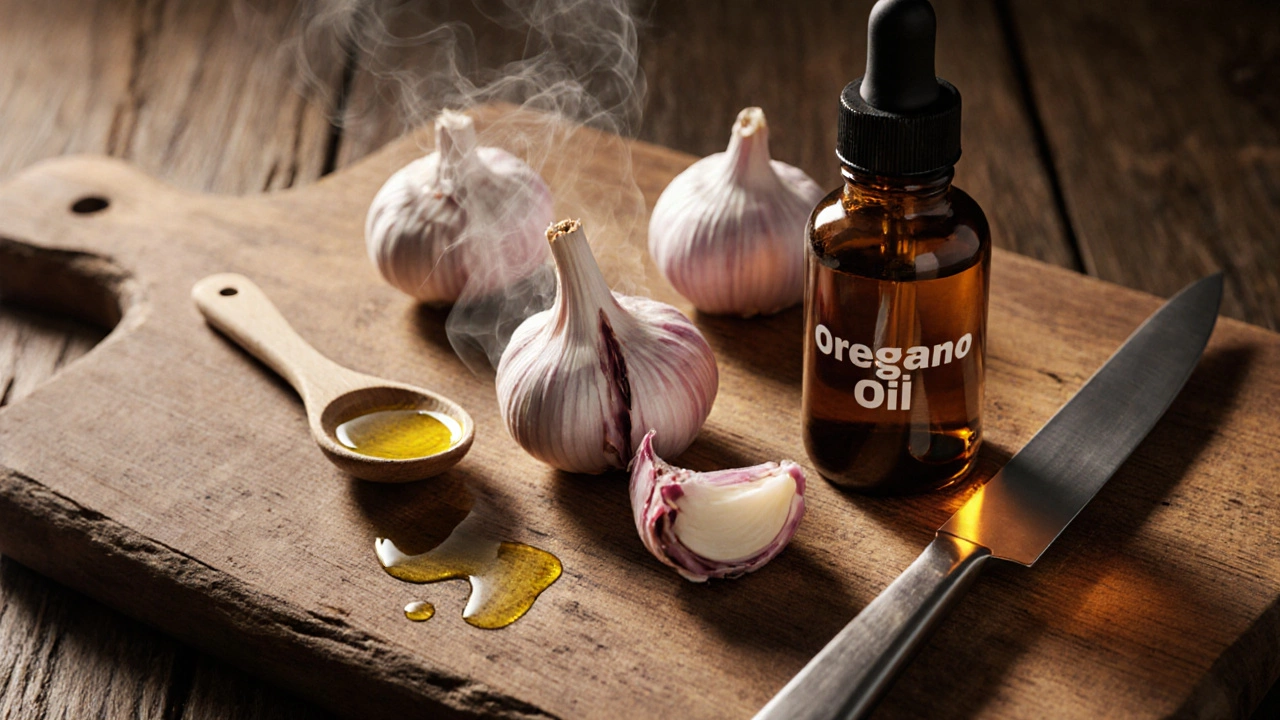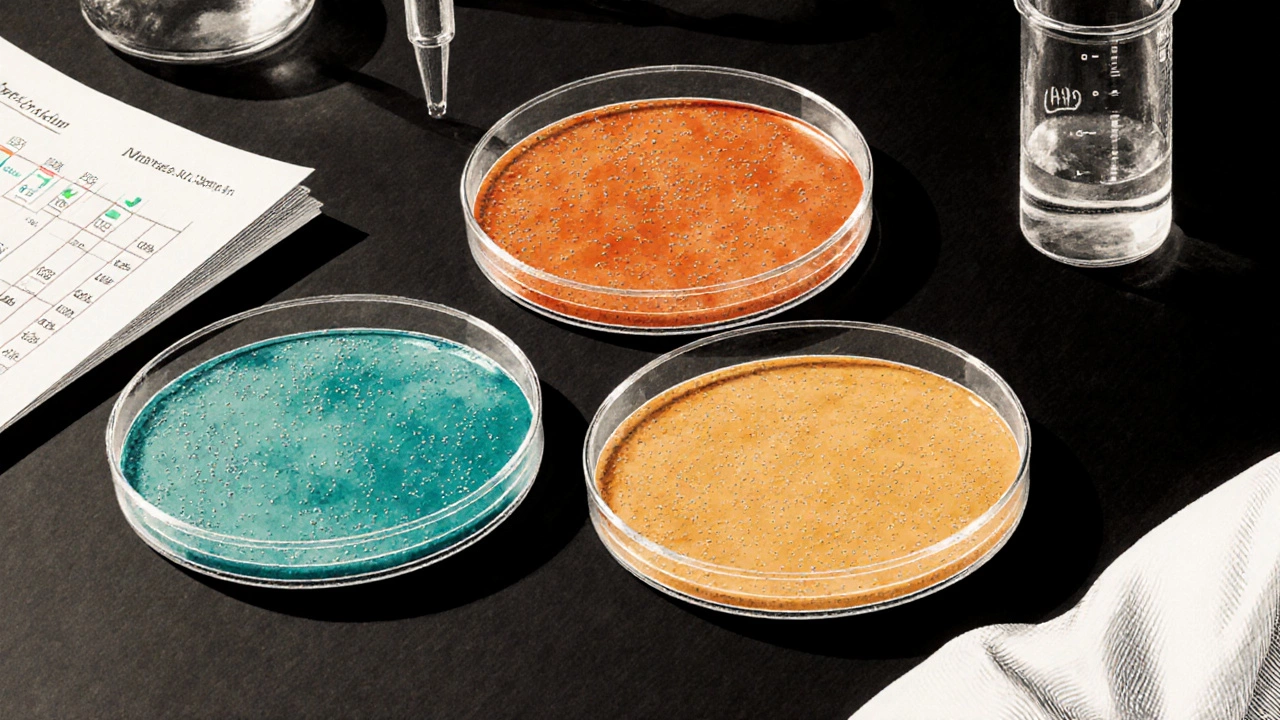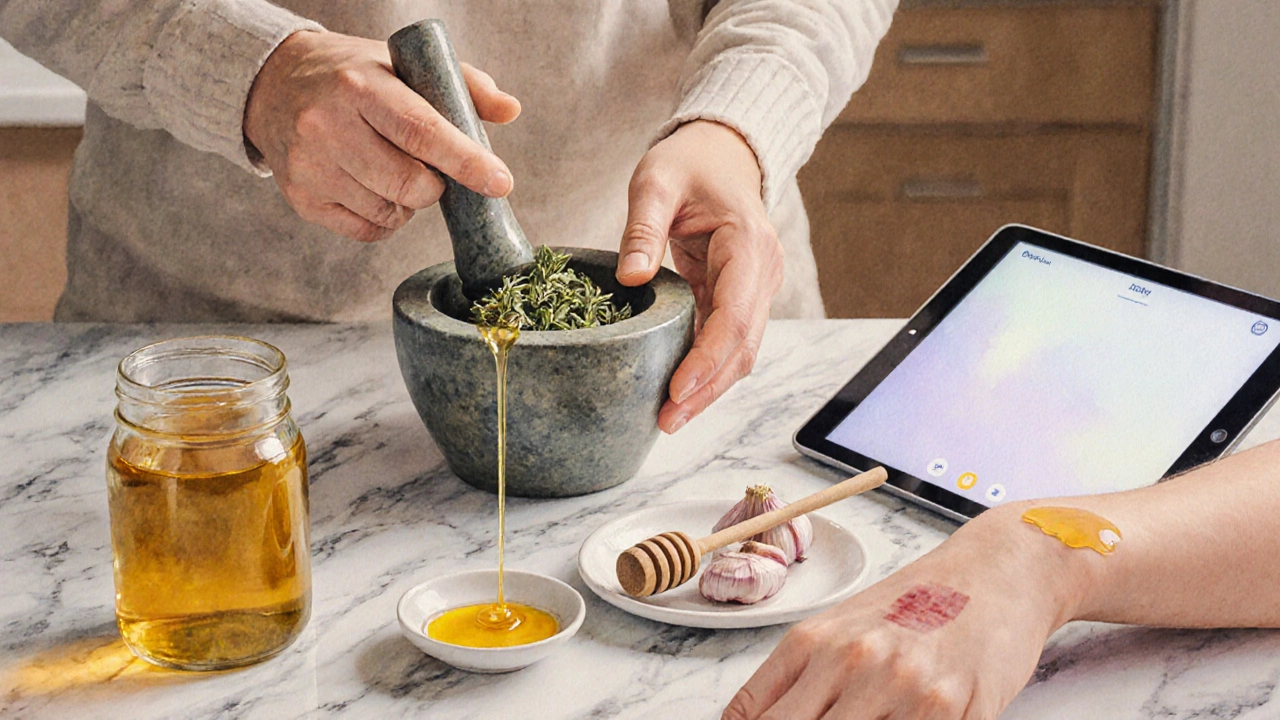 Oct, 14 2025
Oct, 14 2025
Natural Antibiotic Dosage Calculator
Calculate Your Natural Antibiotic Dosage
Enter your details below to determine a safe, effective dosage based on the latest research.
Quick Takeaways
- Garlic (allicin) and oregano oil (carvacrol) have the highest laboratory‑measured antibacterial potency.
- Manuka honey offers a uniqueMGOgrade that can kill resistant skin pathogens.
- Most natural antibiotics work best for mild infections; severe or systemic infections still need prescription drugs.
- Proper dosage and preparation are key - raw, crushed, or properly diluted forms retain activity.
- Consult an online doctor if symptoms persist beyond 48hours or if you have chronic conditions.
What Makes a Natural Substance an "Antibiotic"?
In everyday language, an antibiotic is anything that kills or slows the growth of bacteria. Garlic is a bulb that contains allicin, a sulfur‑based compound known for broad‑spectrum antibacterial effects and has been used for centuries in folk medicine. Modern science classifies natural antibiotics by two main criteria: potency (how much bacterial kill it achieves in a lab test) and spectrum (whether it targets just a few species or many). When we talk about the "strongest" natural antibiotic, we look at the highest minimum inhibitory concentration (MIC) reduction against a range of common pathogens such as Staphylococcus aureus, E. coli, and Streptococcus pneumoniae.

How Strength Is Measured
Researchers perform MIC assays, where they expose bacteria to serial dilutions of a substance until growth stops. The lower the MIC value (measured in µg/mL), the stronger the antibacterial action. For example, allicin from garlic often shows MICs between 4-16µg/mL, while carvacrol from oregano oil can dip below 2µg/mL for some strains - making oregano oil one of the most potent natural agents documented.
Another metric is the zone of inhibition in agar diffusion tests; larger zones indicate more killing power. While lab results don’t always translate directly to human use (bioavailability, metabolism, and delivery matter), they give us a solid ranking foundation.
Top Natural Antibiotics Ranked by Potency
Below is a curated list of the most researched natural antibiotics, ordered by laboratory potency and supported by peer‑reviewed studies up to 2024.
-
Oregano Oil is an essential oil rich in carvacrol and thymol, compounds that disrupt bacterial cell membranes. MIC values as low as 0.5µg/mL have been recorded against MRSA and Helicobacter pylori. Studies from the Journal of Food Protection (2023) highlight its rapid bactericidal action when diluted to 0.1% in aqueous solutions.
-
Garlic contains allicin, which interferes with bacterial enzyme systems and DNA synthesis. Allicin’s MIC ranges from 4-16µg/mL for S. aureus and E. coli. A meta‑analysis in Phytotherapy Research (2022) shows that daily consumption of 2-3 cloves (~5g raw) reduces the incidence of upper‑respiratory infections by 30%.
-
Manuka Honey is a monofloral honey from NewZealand with a unique methylglyoxal (MGO) profile that gives it strong antibacterial properties. MGO‑graded honey (e.g., UMF20+) demonstrates MICs of 8-12µg/mL against Pseudomonas aeruginosa and works well on wound surfaces. Clinical trials in the British Journal of Dermatology (2021) report faster healing of diabetic foot ulcers when applied twice daily.
-
Echinacea is a flowering plant whose roots contain cynarin and alkamides that modulate immune response and possess mild antibacterial activity. MICs hover around 250‑500µg/mL, making it less potent but useful as an immune‑boosting adjunct.
-
Goldenseal provides berberine, an alkaloid that inhibits bacterial DNA gyrase. Laboratory data show MICs of 10‑30µg/mL against Streptococcus pyogenes. However, berberine can interact with several prescription drugs, so caution is advised.
-
Cranberry contains proanthocyanidins that prevent bacterial adhesion, particularly in urinary tract infections. While not a bactericidal agent, it lowers recurrence rates by up to 40% when taken as 500mg juice concentrate daily.
-
Turmeric holds curcumin, a polyphenol with modest antibacterial effects against H. pylori and oral pathogens. MICs are generally >200µg/mL; its strength lies in anti‑inflammatory synergy when combined with piperine.
-
Tea Tree Oil is a topical essential oil rich in terpinen‑4‑ol, effective against skin bacteria like Propionibacterium acnes. In vitro MICs of 0.5‑2µg/mL make it a potent surface disinfectant, but ingestion is unsafe.
Side‑by‑Side Comparison
| Natural Antibiotic | Active Compound(s) | Typical MIC (µg/mL) | Primary Use | Safety Notes |
|---|---|---|---|---|
| Oregano Oil | Carvacrol, Thymol | 0.5-2 | Respiratory, GI infections (diluted) | Can irritate GI lining; avoid >5% concentration. |
| Garlic | Allicin | 4-16 | Upper‑respiratory, mild GI infections | May thin blood; monitor if on anticoagulants. |
| Manuka Honey | Methylglyoxal (MGO) | 8-12 | Wound care, skin infections | High sugar content; not for diabetic ulcers without doctor guidance. |
| Echinacea | Cynarin, Alkamides | 250-500 | Immune support, mild sinus infections | Allergic reactions in ragweed‑sensitive individuals. |
| Goldenseal | Berberine | 10-30 | Throat infections, GI upset | Drug interactions (e.g., cyclosporine, statins). |
| Cranberry | Proanthocyanidins | - (anti‑adhesion) | UTI prevention | May increase risk of kidney stones in susceptible users. |
| Turmeric | Curcumin | >200 | GI infections, anti‑inflammatory | Low bioavailability; combine with piperine. |
| Tea Tree Oil | Terpinen‑4‑ol | 0.5-2 (topical) | Skin infections, acne | Never ingest; can cause dermatitis in some. |

How to Use Natural Antibiotics Safely
Even the "strongest" natural agents can cause side effects if misused. Here are practical tips:
- Dosage matters: For garlic, crush fresh cloves and let them sit 10minutes to activate allicin, then consume 1-2g daily. Oregano oil should be diluted to 0.1% (about 1drop in 5mL carrier oil) before oral intake.
- Timing: Take antimicrobial herbs on an empty stomach to improve absorption, except honey, which works best applied directly to a wound.
- Duration: Limit any single‑agent course to 5‑7days unless a clinician advises longer. Prolonged use can disturb gut flora.
- Interactions: Garlic and goldenseal can amplify the effect of blood‑thinners. Berberine (goldenseal) may raise levels of certain heart medications.
- Pregnancy & children: Avoid high‑dose oregano oil and goldenseal; opt for milder options like diluted honey or low‑dose cranberry juice.
If you notice worsening symptoms, fever above 38°C, or signs of infection spreading (red streaks, swelling, shortness of breath), stop the natural remedy and schedule an online doctor consultation immediately.
When to Call an Online Doctor
Natural antibiotics shine for minor, early‑stage infections, but they aren’t a substitute for prescription therapy in serious cases. Use an online doctor portal if:
- You have a high fever or chills that persist beyond 48hours.
- Symptoms involve the chest, abdomen, or urinary tract with pain that doesn’t improve.
- You have chronic diseases (diabetes, immunosuppression) that raise infection risk.
- You’re already on antibiotics and wonder about adding a natural supplement - drug‑herb interactions need professional review.
Most telehealth platforms can prescribe the right antibiotic within minutes after a video or chat assessment, and they’ll guide you on how to combine or transition from natural agents safely.
Frequently Asked Questions
Can garlic replace prescription antibiotics?
Garlic has proven antibacterial activity in labs, but its potency is lower than most prescription drugs. It can help mild colds or early sinus infections, but for serious or systemic infections a doctor‑prescribed antibiotic is still required.
How much oregano oil is safe to take daily?
A common safe dose is 1-2 drops diluted in a tablespoon of olive oil, taken up to twice a day. Never exceed a 5% concentration without medical supervision, as higher levels can irritate the stomach lining.
Is Manuka honey good for oral infections?
Yes. The high MGO content kills gum‑associated bacteria. Swish a teaspoon of UMF15+ honey for a minute, then spit it out. Do this three times a day, but avoid if you have severe dental abscesses that need professional care.
Can I use tea tree oil for a sore throat?
No. Tea tree oil is toxic if swallowed and only approved for topical use. For a sore throat stick to safe oral agents like honey, warm salt water, or diluted oregano oil.
Do natural antibiotics cause antibiotic resistance?
Resistance to plant‑derived compounds is far less common, but bacteria can adapt over time. Rotating between different natural agents and limiting duration reduces any theoretical risk.
